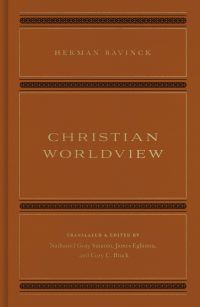Herman Bavinck, Dutch theologian and Christian leader of the late 19th/early 20th centuries, delivered the first edition of his Christian Worldview in 1904, and later revised and republished it in 1913. Through the good work of Crossway publishers and editorial/translation work of Nathaniel Gray Sutanto, James Eglinton, and Cory C. Brock, this important work is now available in English.
While the notion of a world and life view has persisted for millennia, the word “worldview” was not coined until 1790 by Immanuel Kant (originally the German weltanschauung) and quickly became common-speak in the Western world. By the late 19th and early 20th centuries, Christian worldview had become a central theme. David Naugle argues that the “headwaters of Christian worldview thinking can be traced back to the Scottish Presbyterian theologian James Orr and to the Dutch Reformed polymath Abraham Kuyper” (Naugle, Worldview; The History of a Concept, xviii).
SUMMARY OF THREE CHAPTERS
In the vein of Kuyperian thought and influence, Bavinck offers his slim, three-chapter work on Christian worldview as a front-footed, unapologetic case for believing the truth of Christian Scripture as the only story that accounts for the world as we know and experience it.
 Weighing in at only 133 pages, let not the brevity of the book deceive concerning its depth or density. Bavinck addresses three basic questions that he believes are “problems” that have confronted and continue to confront the human mind: “What am I? What is the world? And what is my place and task in the world?” (29). His chapter titles address these questions respectively as “Thinking and Being,” “Being and Becoming,” and “Becoming and Acting.” He ends his introduction with this preliminary answer to these questions:
Weighing in at only 133 pages, let not the brevity of the book deceive concerning its depth or density. Bavinck addresses three basic questions that he believes are “problems” that have confronted and continue to confront the human mind: “What am I? What is the world? And what is my place and task in the world?” (29). His chapter titles address these questions respectively as “Thinking and Being,” “Being and Becoming,” and “Becoming and Acting.” He ends his introduction with this preliminary answer to these questions:
Autonomous thinking finds no satisfactory answer to these questions—it oscillates between materialism and spiritualism, between atomism and dynamism, between nomism and antinomianism. But Christianity preserves the harmony [between them] and reveals to us a wisdom that reconciles the human being with God and, through this, with itself, with the world, and with life. (sic., 29)
As a point of advice to future readers, allow the quote above to serve as a constant clarifier for the rest of the volume. With each chapter, Bavinck attacks the question at hand, though the journey between question and answer is sometimes difficult to follow. He commonly takes sharp turns down the path of rival worldviews and ideas, sometimes seeming to agree or argue in favor of the position, only to turn back just as quickly in favor of the Christian view.
In chapter one, Bavinck argues that we are capable of knowing only because God has known first. Then, “the doctrine of the creation of all things by the Word of God is the explanation of all knowing and knowing about,” for this assumes a correspondence between the knower and the thing known (46). He continues, insisting that “the deeper one thinks this through, [the clearer it becomes that] all truth is understood in the Wisdom, in the Word, who was in the beginning with God and who himself was God. The one who denies this Wisdom undermines the ‘foundation’ of all science…” (sic, 47, italics added for emphasis).
Bavinck’s emphasis on wisdom is noteworthy and relatively unique in the broader—and more popular—worldview literature. Throughout the book, Christian wisdom serves as the clue to worldview. Thus, in chapter two Bavinck demonstrates the superiority of the “organic” worldview over what he calls the monistic-mechanical approach on one side and the dynamic/energetic approach on the other. He argues that the organic view does justice to the oneness and diversity of creation, and to “being and becoming.”
Bavink notes that wisdom accounts for the essence of all things, but adds that God’s will (decrees) must be joined to wisdom to account for their existence in the world. Wisdom and will, then, account for the dynamism and development in the world that the mechanistic and energetic views cannot.
Finally, Bavinck’s final chapter calls its readers to recognize that we are designed to conform to God’s laws and norms in the world: “You shall love the true, the good and the beautiful with all your soul; and you shall love God above all else and then your neighbor as yourself” (95). This isn’t accomplished by individualism, communism, or autonomous reason, but only by the Christian faith. “Christianity is not exclusively a teaching about salvation, but it is salvation itself, brought about by God in the history of the world,” centered on the person and work of Christ, concluding with the end of the ages (115-116).
THREE TAKEAWAYS
First, Bavinck’s consistent pushback against individualism and autonomous reason remains timeless counsel that we do well to heed today. In our day, as in Bavinck’s, the temptation to assume center stage as though the function of human reason is the beginning of wisdom remains a fatal flaw in the pursuit of right living in God’s world.
Second, Bavinck’s awareness of the broader disciplines is exemplary. He was not only conversant and up to date in the sciences, but his unique ability to penetrate the assumptions, methods, strengths, flaws, and plausibility of differing views yields insight that remains valuable even more than 100 years later.
Finally, as noted above, the emphasis on divine wisdom is commendable and unique. While I have concerns about an over-intellectualized understanding of wisdom in the book, Bavinck rightly and repeatedly returns to God’s wisdom as essential for a proper view of the world.
Bavinck’s work is an important addition to the last hundred years of Christian worldview literature. It will quickly become a classic volume for Christian philosophers, theologians, and worldview teachers everywhere.
Benjamin Quinn is academic director of the BibleMesh Institute. This review first appeared at erlc.com.
